Human Development: Analyzing Personal Growth Through Life Event
VerifiedAdded on 2022/08/20
|8
|2425
|14
Essay
AI Summary
This essay explores the impact of a student's life event—a family move from Sydney to Melbourne—on their personal development, analyzed through the lenses of Bronfenbrenner's Ecological Theory and Maslow's Hierarchy of Needs. The student reflects on how the move influenced their values and mental health, discussing the five environmental systems of Bronfenbrenner's theory and the hierarchy of needs. The essay integrates scholarly articles to support the analysis, demonstrating how the new environment and social interactions shaped the student's behavior, social skills, and understanding of relationships. The student highlights the importance of social connections and the ability to adapt to new surroundings, offering insights into the complexities of human development. The student's experiences are used to illustrate the practical application of these theories in real-life scenarios, concluding with the importance of personal growth and the positive shaping of personality through life experiences.
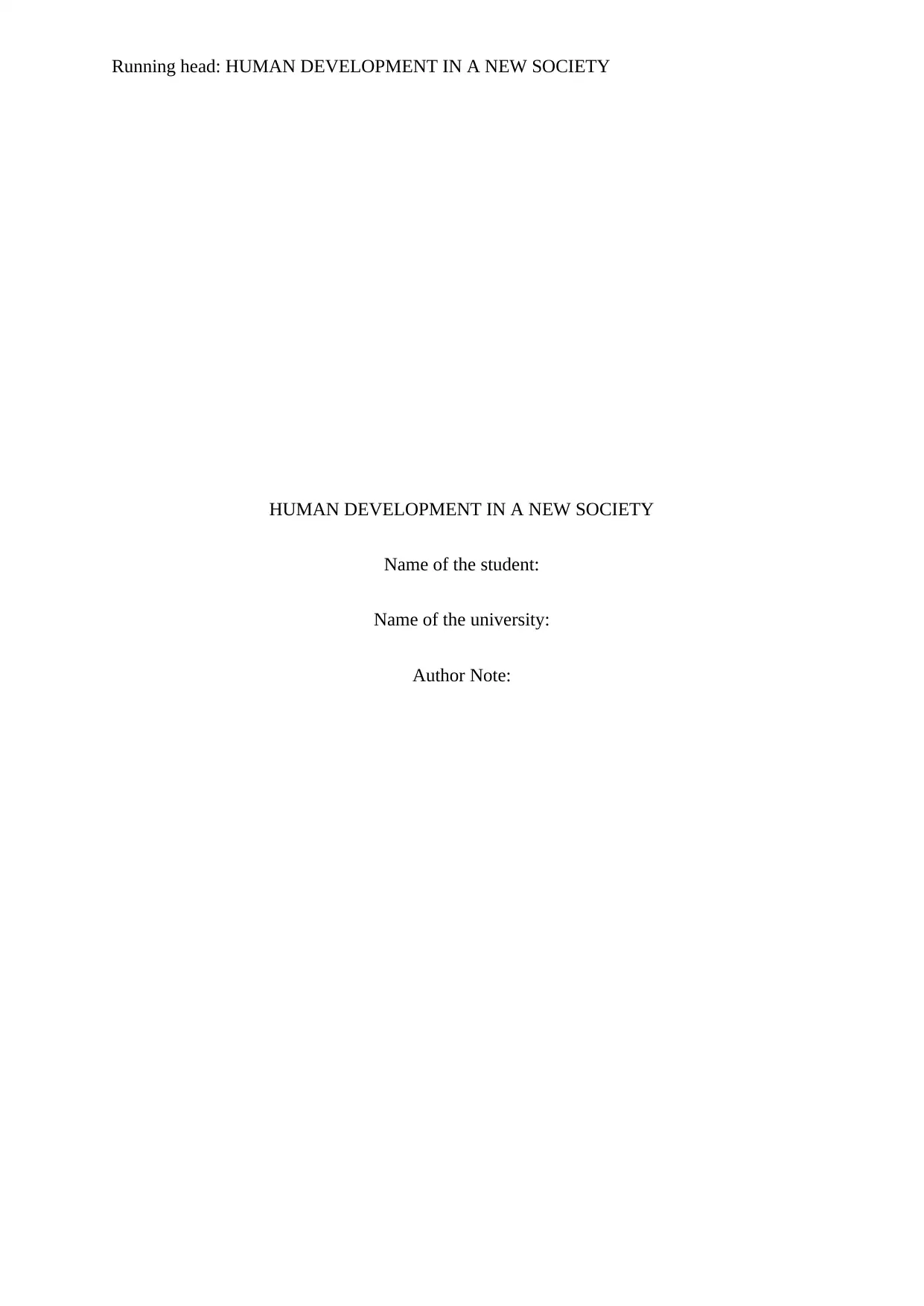
Running head: HUMAN DEVELOPMENT IN A NEW SOCIETY
HUMAN DEVELOPMENT IN A NEW SOCIETY
Name of the student:
Name of the university:
Author Note:
HUMAN DEVELOPMENT IN A NEW SOCIETY
Name of the student:
Name of the university:
Author Note:
Paraphrase This Document
Need a fresh take? Get an instant paraphrase of this document with our AI Paraphraser
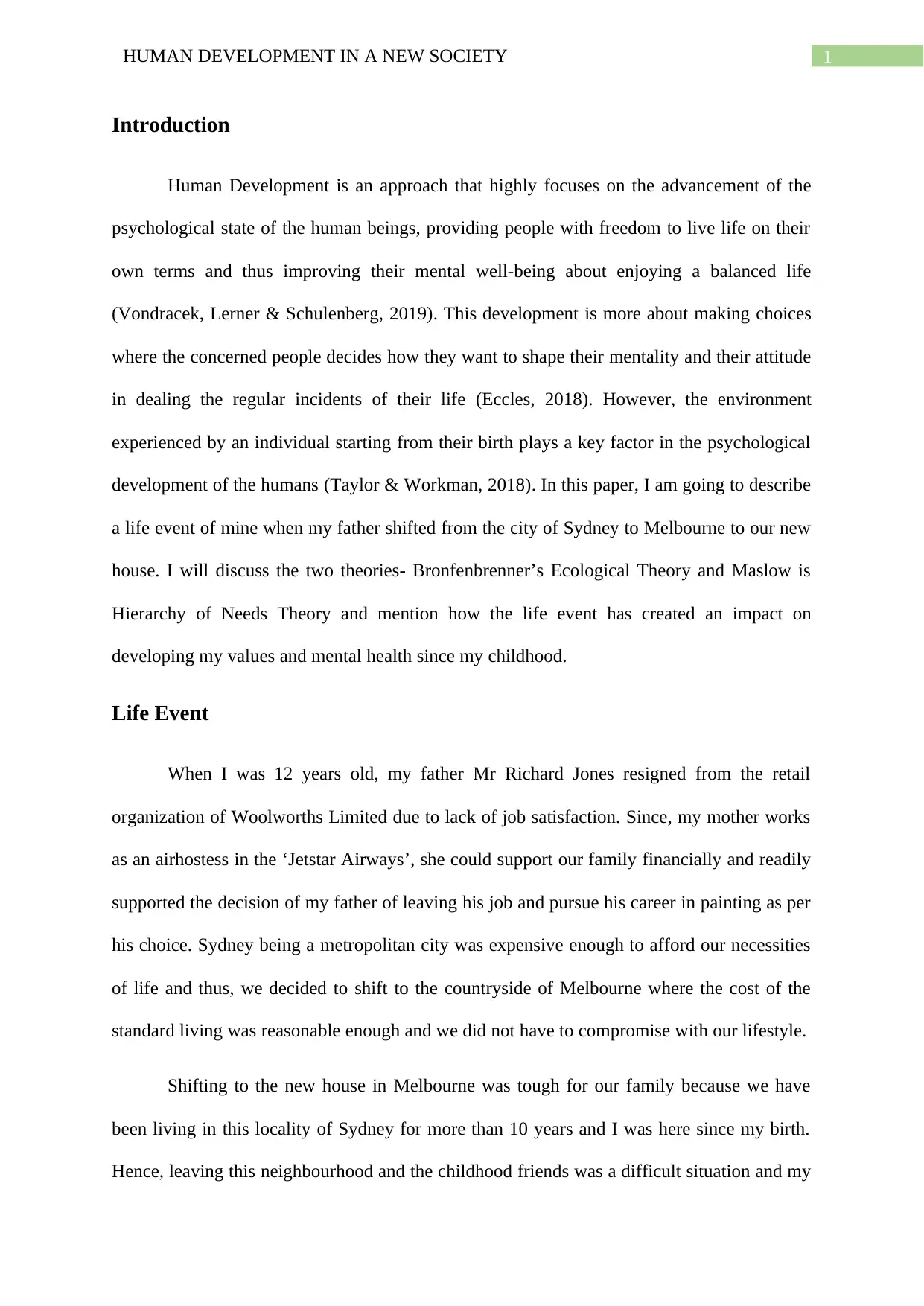
1HUMAN DEVELOPMENT IN A NEW SOCIETY
Introduction
Human Development is an approach that highly focuses on the advancement of the
psychological state of the human beings, providing people with freedom to live life on their
own terms and thus improving their mental well-being about enjoying a balanced life
(Vondracek, Lerner & Schulenberg, 2019). This development is more about making choices
where the concerned people decides how they want to shape their mentality and their attitude
in dealing the regular incidents of their life (Eccles, 2018). However, the environment
experienced by an individual starting from their birth plays a key factor in the psychological
development of the humans (Taylor & Workman, 2018). In this paper, I am going to describe
a life event of mine when my father shifted from the city of Sydney to Melbourne to our new
house. I will discuss the two theories- Bronfenbrenner’s Ecological Theory and Maslow is
Hierarchy of Needs Theory and mention how the life event has created an impact on
developing my values and mental health since my childhood.
Life Event
When I was 12 years old, my father Mr Richard Jones resigned from the retail
organization of Woolworths Limited due to lack of job satisfaction. Since, my mother works
as an airhostess in the ‘Jetstar Airways’, she could support our family financially and readily
supported the decision of my father of leaving his job and pursue his career in painting as per
his choice. Sydney being a metropolitan city was expensive enough to afford our necessities
of life and thus, we decided to shift to the countryside of Melbourne where the cost of the
standard living was reasonable enough and we did not have to compromise with our lifestyle.
Shifting to the new house in Melbourne was tough for our family because we have
been living in this locality of Sydney for more than 10 years and I was here since my birth.
Hence, leaving this neighbourhood and the childhood friends was a difficult situation and my
Introduction
Human Development is an approach that highly focuses on the advancement of the
psychological state of the human beings, providing people with freedom to live life on their
own terms and thus improving their mental well-being about enjoying a balanced life
(Vondracek, Lerner & Schulenberg, 2019). This development is more about making choices
where the concerned people decides how they want to shape their mentality and their attitude
in dealing the regular incidents of their life (Eccles, 2018). However, the environment
experienced by an individual starting from their birth plays a key factor in the psychological
development of the humans (Taylor & Workman, 2018). In this paper, I am going to describe
a life event of mine when my father shifted from the city of Sydney to Melbourne to our new
house. I will discuss the two theories- Bronfenbrenner’s Ecological Theory and Maslow is
Hierarchy of Needs Theory and mention how the life event has created an impact on
developing my values and mental health since my childhood.
Life Event
When I was 12 years old, my father Mr Richard Jones resigned from the retail
organization of Woolworths Limited due to lack of job satisfaction. Since, my mother works
as an airhostess in the ‘Jetstar Airways’, she could support our family financially and readily
supported the decision of my father of leaving his job and pursue his career in painting as per
his choice. Sydney being a metropolitan city was expensive enough to afford our necessities
of life and thus, we decided to shift to the countryside of Melbourne where the cost of the
standard living was reasonable enough and we did not have to compromise with our lifestyle.
Shifting to the new house in Melbourne was tough for our family because we have
been living in this locality of Sydney for more than 10 years and I was here since my birth.
Hence, leaving this neighbourhood and the childhood friends was a difficult situation and my
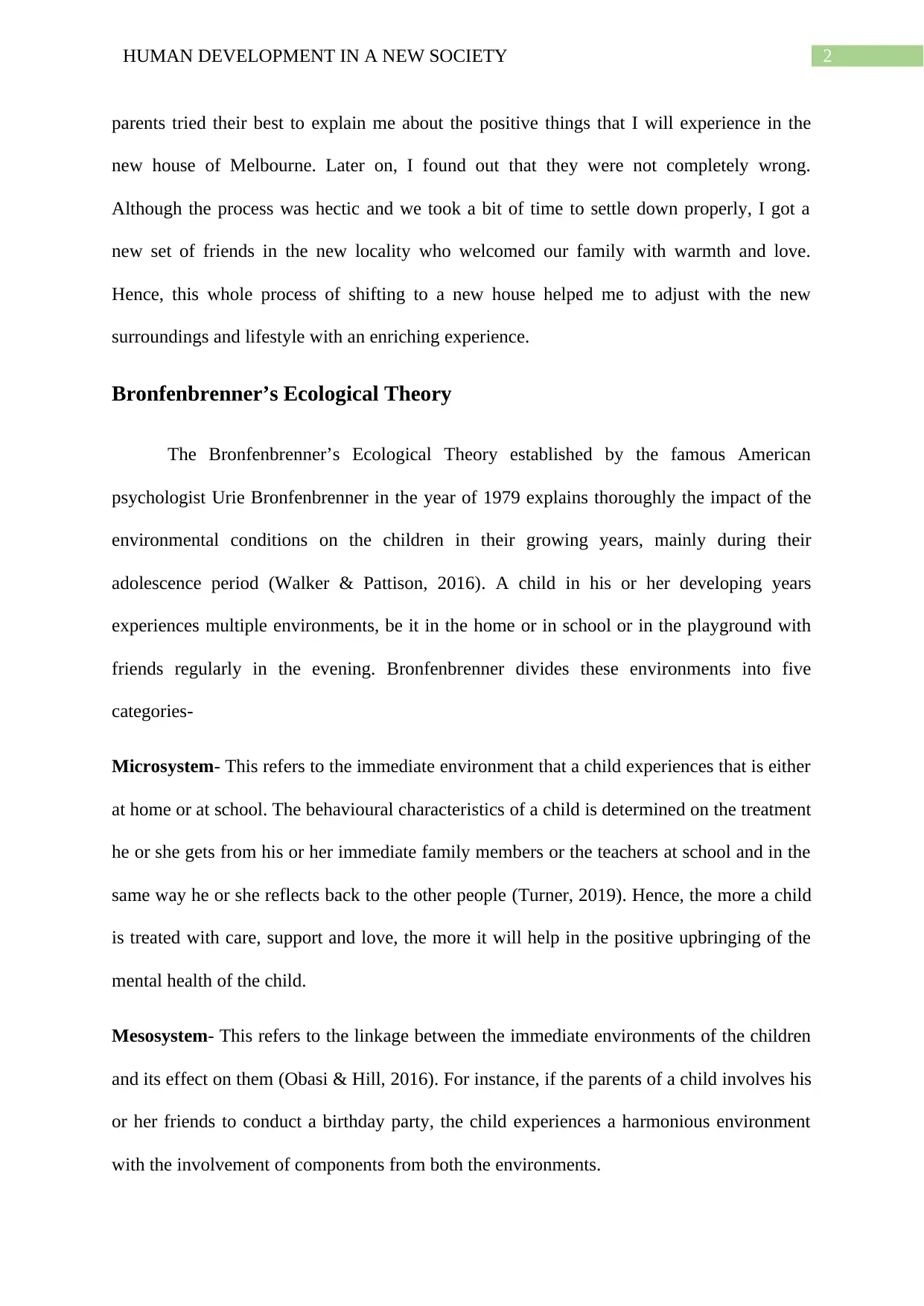
2HUMAN DEVELOPMENT IN A NEW SOCIETY
parents tried their best to explain me about the positive things that I will experience in the
new house of Melbourne. Later on, I found out that they were not completely wrong.
Although the process was hectic and we took a bit of time to settle down properly, I got a
new set of friends in the new locality who welcomed our family with warmth and love.
Hence, this whole process of shifting to a new house helped me to adjust with the new
surroundings and lifestyle with an enriching experience.
Bronfenbrenner’s Ecological Theory
The Bronfenbrenner’s Ecological Theory established by the famous American
psychologist Urie Bronfenbrenner in the year of 1979 explains thoroughly the impact of the
environmental conditions on the children in their growing years, mainly during their
adolescence period (Walker & Pattison, 2016). A child in his or her developing years
experiences multiple environments, be it in the home or in school or in the playground with
friends regularly in the evening. Bronfenbrenner divides these environments into five
categories-
Microsystem- This refers to the immediate environment that a child experiences that is either
at home or at school. The behavioural characteristics of a child is determined on the treatment
he or she gets from his or her immediate family members or the teachers at school and in the
same way he or she reflects back to the other people (Turner, 2019). Hence, the more a child
is treated with care, support and love, the more it will help in the positive upbringing of the
mental health of the child.
Mesosystem- This refers to the linkage between the immediate environments of the children
and its effect on them (Obasi & Hill, 2016). For instance, if the parents of a child involves his
or her friends to conduct a birthday party, the child experiences a harmonious environment
with the involvement of components from both the environments.
parents tried their best to explain me about the positive things that I will experience in the
new house of Melbourne. Later on, I found out that they were not completely wrong.
Although the process was hectic and we took a bit of time to settle down properly, I got a
new set of friends in the new locality who welcomed our family with warmth and love.
Hence, this whole process of shifting to a new house helped me to adjust with the new
surroundings and lifestyle with an enriching experience.
Bronfenbrenner’s Ecological Theory
The Bronfenbrenner’s Ecological Theory established by the famous American
psychologist Urie Bronfenbrenner in the year of 1979 explains thoroughly the impact of the
environmental conditions on the children in their growing years, mainly during their
adolescence period (Walker & Pattison, 2016). A child in his or her developing years
experiences multiple environments, be it in the home or in school or in the playground with
friends regularly in the evening. Bronfenbrenner divides these environments into five
categories-
Microsystem- This refers to the immediate environment that a child experiences that is either
at home or at school. The behavioural characteristics of a child is determined on the treatment
he or she gets from his or her immediate family members or the teachers at school and in the
same way he or she reflects back to the other people (Turner, 2019). Hence, the more a child
is treated with care, support and love, the more it will help in the positive upbringing of the
mental health of the child.
Mesosystem- This refers to the linkage between the immediate environments of the children
and its effect on them (Obasi & Hill, 2016). For instance, if the parents of a child involves his
or her friends to conduct a birthday party, the child experiences a harmonious environment
with the involvement of components from both the environments.
⊘ This is a preview!⊘
Do you want full access?
Subscribe today to unlock all pages.

Trusted by 1+ million students worldwide
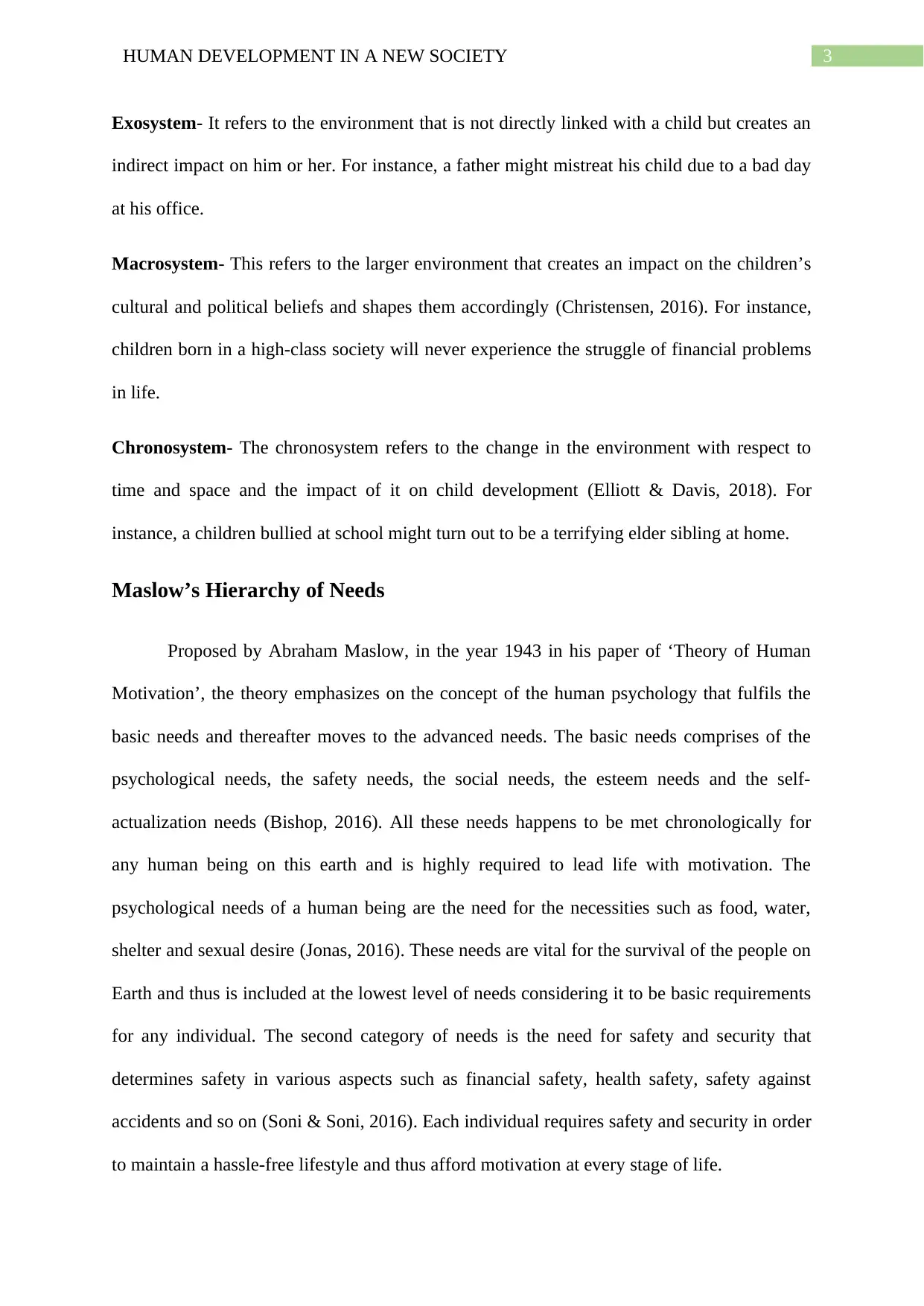
3HUMAN DEVELOPMENT IN A NEW SOCIETY
Exosystem- It refers to the environment that is not directly linked with a child but creates an
indirect impact on him or her. For instance, a father might mistreat his child due to a bad day
at his office.
Macrosystem- This refers to the larger environment that creates an impact on the children’s
cultural and political beliefs and shapes them accordingly (Christensen, 2016). For instance,
children born in a high-class society will never experience the struggle of financial problems
in life.
Chronosystem- The chronosystem refers to the change in the environment with respect to
time and space and the impact of it on child development (Elliott & Davis, 2018). For
instance, a children bullied at school might turn out to be a terrifying elder sibling at home.
Maslow’s Hierarchy of Needs
Proposed by Abraham Maslow, in the year 1943 in his paper of ‘Theory of Human
Motivation’, the theory emphasizes on the concept of the human psychology that fulfils the
basic needs and thereafter moves to the advanced needs. The basic needs comprises of the
psychological needs, the safety needs, the social needs, the esteem needs and the self-
actualization needs (Bishop, 2016). All these needs happens to be met chronologically for
any human being on this earth and is highly required to lead life with motivation. The
psychological needs of a human being are the need for the necessities such as food, water,
shelter and sexual desire (Jonas, 2016). These needs are vital for the survival of the people on
Earth and thus is included at the lowest level of needs considering it to be basic requirements
for any individual. The second category of needs is the need for safety and security that
determines safety in various aspects such as financial safety, health safety, safety against
accidents and so on (Soni & Soni, 2016). Each individual requires safety and security in order
to maintain a hassle-free lifestyle and thus afford motivation at every stage of life.
Exosystem- It refers to the environment that is not directly linked with a child but creates an
indirect impact on him or her. For instance, a father might mistreat his child due to a bad day
at his office.
Macrosystem- This refers to the larger environment that creates an impact on the children’s
cultural and political beliefs and shapes them accordingly (Christensen, 2016). For instance,
children born in a high-class society will never experience the struggle of financial problems
in life.
Chronosystem- The chronosystem refers to the change in the environment with respect to
time and space and the impact of it on child development (Elliott & Davis, 2018). For
instance, a children bullied at school might turn out to be a terrifying elder sibling at home.
Maslow’s Hierarchy of Needs
Proposed by Abraham Maslow, in the year 1943 in his paper of ‘Theory of Human
Motivation’, the theory emphasizes on the concept of the human psychology that fulfils the
basic needs and thereafter moves to the advanced needs. The basic needs comprises of the
psychological needs, the safety needs, the social needs, the esteem needs and the self-
actualization needs (Bishop, 2016). All these needs happens to be met chronologically for
any human being on this earth and is highly required to lead life with motivation. The
psychological needs of a human being are the need for the necessities such as food, water,
shelter and sexual desire (Jonas, 2016). These needs are vital for the survival of the people on
Earth and thus is included at the lowest level of needs considering it to be basic requirements
for any individual. The second category of needs is the need for safety and security that
determines safety in various aspects such as financial safety, health safety, safety against
accidents and so on (Soni & Soni, 2016). Each individual requires safety and security in order
to maintain a hassle-free lifestyle and thus afford motivation at every stage of life.
Paraphrase This Document
Need a fresh take? Get an instant paraphrase of this document with our AI Paraphraser
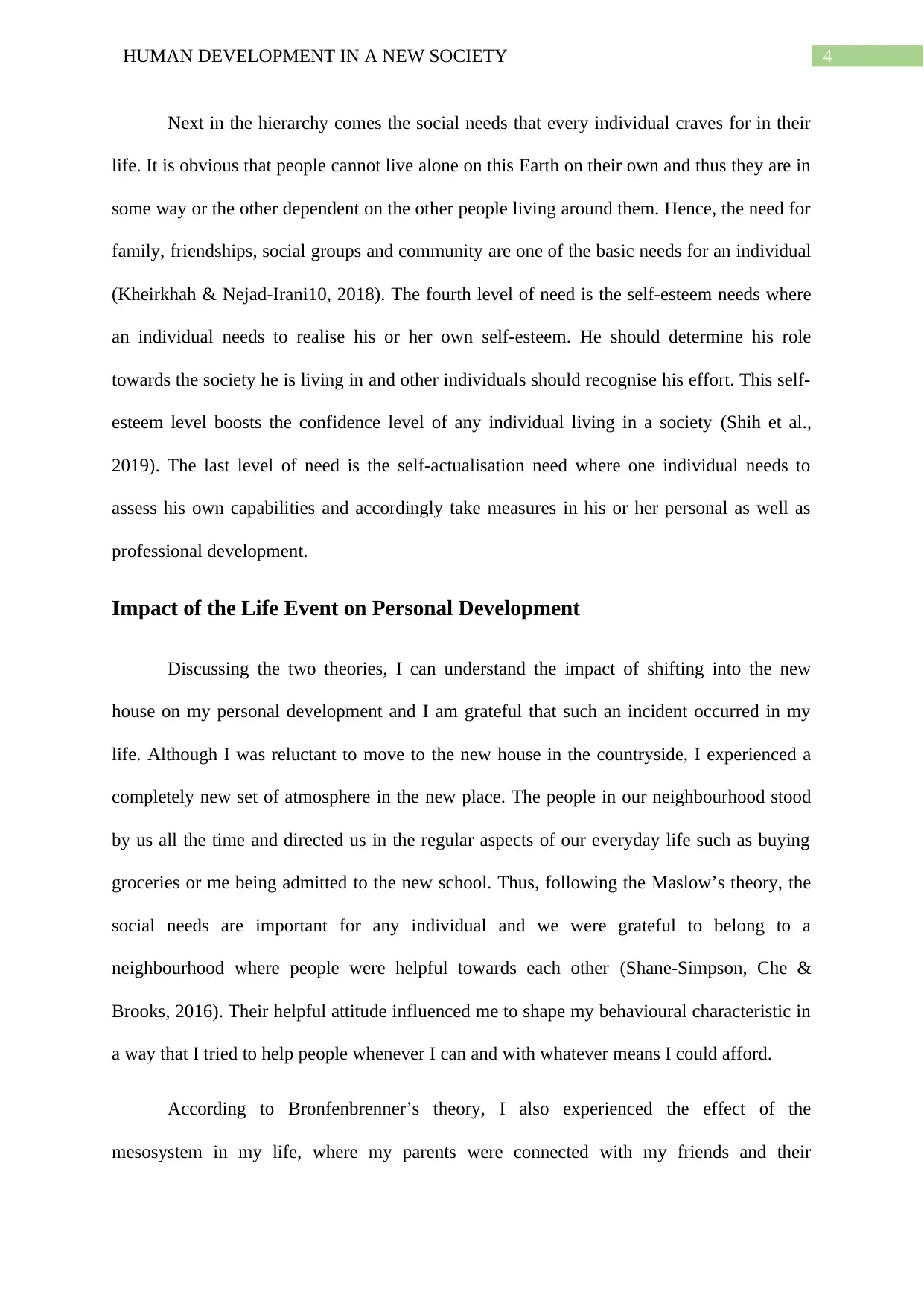
4HUMAN DEVELOPMENT IN A NEW SOCIETY
Next in the hierarchy comes the social needs that every individual craves for in their
life. It is obvious that people cannot live alone on this Earth on their own and thus they are in
some way or the other dependent on the other people living around them. Hence, the need for
family, friendships, social groups and community are one of the basic needs for an individual
(Kheirkhah & Nejad-Irani10, 2018). The fourth level of need is the self-esteem needs where
an individual needs to realise his or her own self-esteem. He should determine his role
towards the society he is living in and other individuals should recognise his effort. This self-
esteem level boosts the confidence level of any individual living in a society (Shih et al.,
2019). The last level of need is the self-actualisation need where one individual needs to
assess his own capabilities and accordingly take measures in his or her personal as well as
professional development.
Impact of the Life Event on Personal Development
Discussing the two theories, I can understand the impact of shifting into the new
house on my personal development and I am grateful that such an incident occurred in my
life. Although I was reluctant to move to the new house in the countryside, I experienced a
completely new set of atmosphere in the new place. The people in our neighbourhood stood
by us all the time and directed us in the regular aspects of our everyday life such as buying
groceries or me being admitted to the new school. Thus, following the Maslow’s theory, the
social needs are important for any individual and we were grateful to belong to a
neighbourhood where people were helpful towards each other (Shane-Simpson, Che &
Brooks, 2016). Their helpful attitude influenced me to shape my behavioural characteristic in
a way that I tried to help people whenever I can and with whatever means I could afford.
According to Bronfenbrenner’s theory, I also experienced the effect of the
mesosystem in my life, where my parents were connected with my friends and their
Next in the hierarchy comes the social needs that every individual craves for in their
life. It is obvious that people cannot live alone on this Earth on their own and thus they are in
some way or the other dependent on the other people living around them. Hence, the need for
family, friendships, social groups and community are one of the basic needs for an individual
(Kheirkhah & Nejad-Irani10, 2018). The fourth level of need is the self-esteem needs where
an individual needs to realise his or her own self-esteem. He should determine his role
towards the society he is living in and other individuals should recognise his effort. This self-
esteem level boosts the confidence level of any individual living in a society (Shih et al.,
2019). The last level of need is the self-actualisation need where one individual needs to
assess his own capabilities and accordingly take measures in his or her personal as well as
professional development.
Impact of the Life Event on Personal Development
Discussing the two theories, I can understand the impact of shifting into the new
house on my personal development and I am grateful that such an incident occurred in my
life. Although I was reluctant to move to the new house in the countryside, I experienced a
completely new set of atmosphere in the new place. The people in our neighbourhood stood
by us all the time and directed us in the regular aspects of our everyday life such as buying
groceries or me being admitted to the new school. Thus, following the Maslow’s theory, the
social needs are important for any individual and we were grateful to belong to a
neighbourhood where people were helpful towards each other (Shane-Simpson, Che &
Brooks, 2016). Their helpful attitude influenced me to shape my behavioural characteristic in
a way that I tried to help people whenever I can and with whatever means I could afford.
According to Bronfenbrenner’s theory, I also experienced the effect of the
mesosystem in my life, where my parents were connected with my friends and their
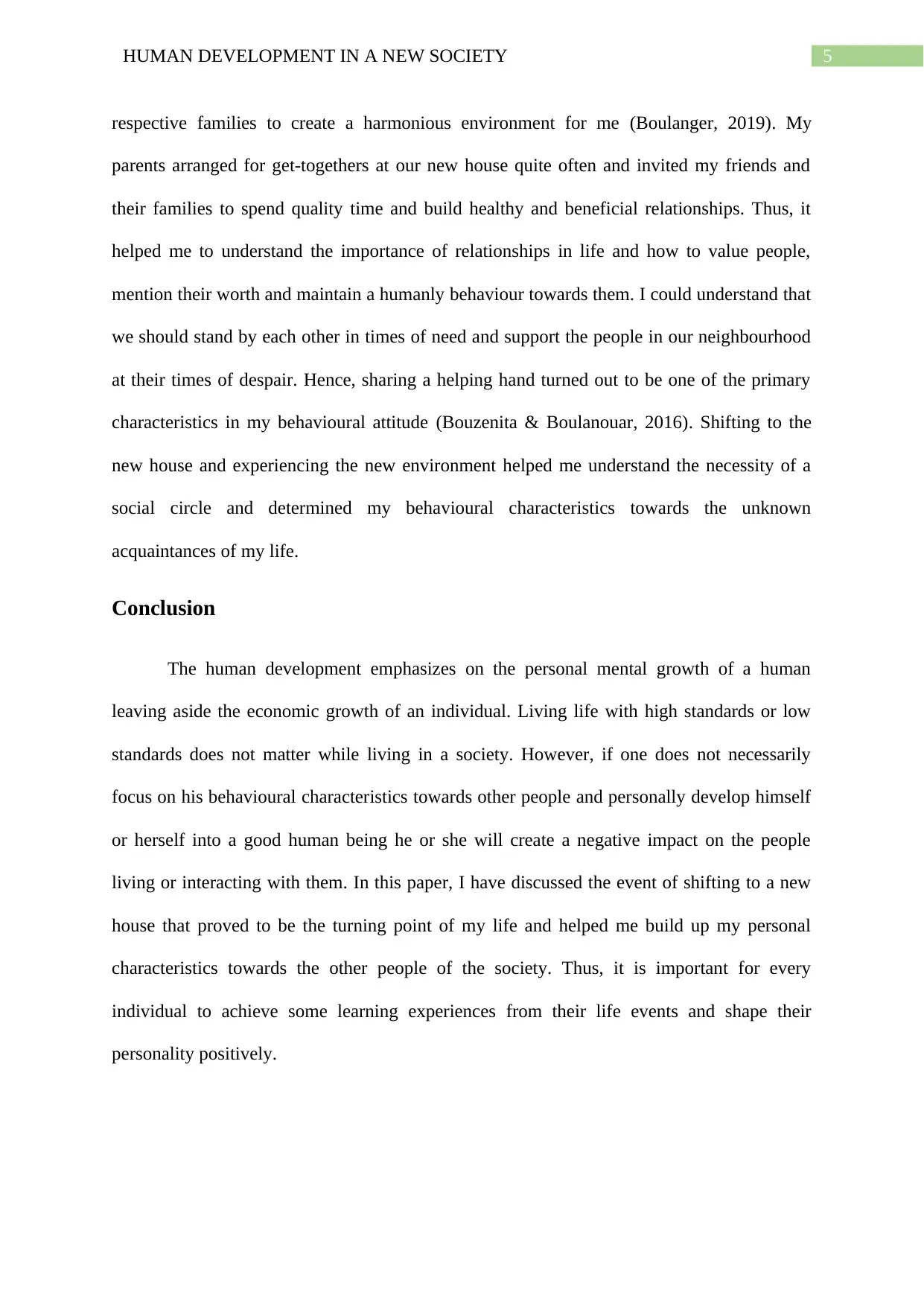
5HUMAN DEVELOPMENT IN A NEW SOCIETY
respective families to create a harmonious environment for me (Boulanger, 2019). My
parents arranged for get-togethers at our new house quite often and invited my friends and
their families to spend quality time and build healthy and beneficial relationships. Thus, it
helped me to understand the importance of relationships in life and how to value people,
mention their worth and maintain a humanly behaviour towards them. I could understand that
we should stand by each other in times of need and support the people in our neighbourhood
at their times of despair. Hence, sharing a helping hand turned out to be one of the primary
characteristics in my behavioural attitude (Bouzenita & Boulanouar, 2016). Shifting to the
new house and experiencing the new environment helped me understand the necessity of a
social circle and determined my behavioural characteristics towards the unknown
acquaintances of my life.
Conclusion
The human development emphasizes on the personal mental growth of a human
leaving aside the economic growth of an individual. Living life with high standards or low
standards does not matter while living in a society. However, if one does not necessarily
focus on his behavioural characteristics towards other people and personally develop himself
or herself into a good human being he or she will create a negative impact on the people
living or interacting with them. In this paper, I have discussed the event of shifting to a new
house that proved to be the turning point of my life and helped me build up my personal
characteristics towards the other people of the society. Thus, it is important for every
individual to achieve some learning experiences from their life events and shape their
personality positively.
respective families to create a harmonious environment for me (Boulanger, 2019). My
parents arranged for get-togethers at our new house quite often and invited my friends and
their families to spend quality time and build healthy and beneficial relationships. Thus, it
helped me to understand the importance of relationships in life and how to value people,
mention their worth and maintain a humanly behaviour towards them. I could understand that
we should stand by each other in times of need and support the people in our neighbourhood
at their times of despair. Hence, sharing a helping hand turned out to be one of the primary
characteristics in my behavioural attitude (Bouzenita & Boulanouar, 2016). Shifting to the
new house and experiencing the new environment helped me understand the necessity of a
social circle and determined my behavioural characteristics towards the unknown
acquaintances of my life.
Conclusion
The human development emphasizes on the personal mental growth of a human
leaving aside the economic growth of an individual. Living life with high standards or low
standards does not matter while living in a society. However, if one does not necessarily
focus on his behavioural characteristics towards other people and personally develop himself
or herself into a good human being he or she will create a negative impact on the people
living or interacting with them. In this paper, I have discussed the event of shifting to a new
house that proved to be the turning point of my life and helped me build up my personal
characteristics towards the other people of the society. Thus, it is important for every
individual to achieve some learning experiences from their life events and shape their
personality positively.
⊘ This is a preview!⊘
Do you want full access?
Subscribe today to unlock all pages.

Trusted by 1+ million students worldwide
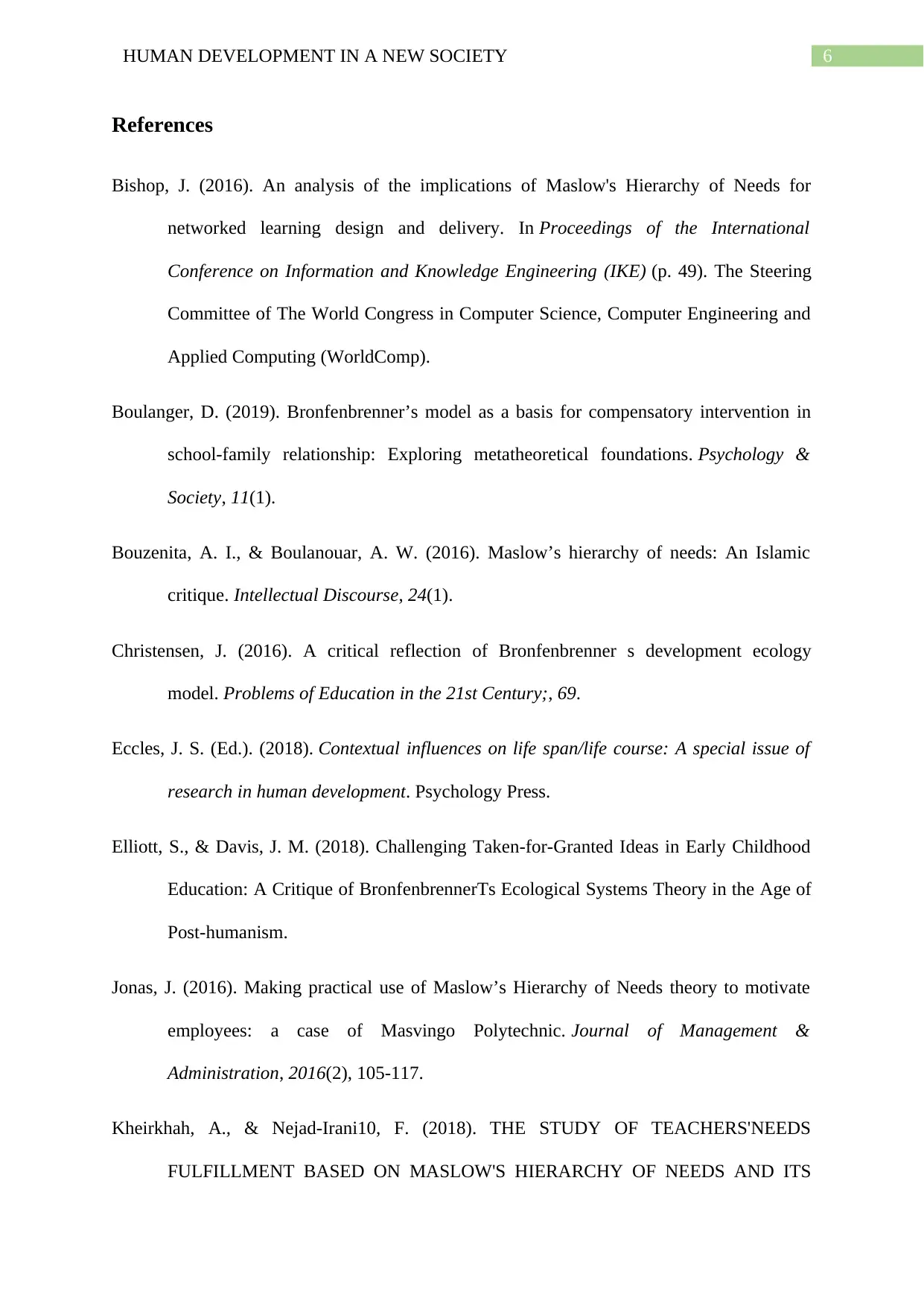
6HUMAN DEVELOPMENT IN A NEW SOCIETY
References
Bishop, J. (2016). An analysis of the implications of Maslow's Hierarchy of Needs for
networked learning design and delivery. In Proceedings of the International
Conference on Information and Knowledge Engineering (IKE) (p. 49). The Steering
Committee of The World Congress in Computer Science, Computer Engineering and
Applied Computing (WorldComp).
Boulanger, D. (2019). Bronfenbrenner’s model as a basis for compensatory intervention in
school-family relationship: Exploring metatheoretical foundations. Psychology &
Society, 11(1).
Bouzenita, A. I., & Boulanouar, A. W. (2016). Maslow’s hierarchy of needs: An Islamic
critique. Intellectual Discourse, 24(1).
Christensen, J. (2016). A critical reflection of Bronfenbrenner s development ecology
model. Problems of Education in the 21st Century;, 69.
Eccles, J. S. (Ed.). (2018). Contextual influences on life span/life course: A special issue of
research in human development. Psychology Press.
Elliott, S., & Davis, J. M. (2018). Challenging Taken-for-Granted Ideas in Early Childhood
Education: A Critique of BronfenbrennerTs Ecological Systems Theory in the Age of
Post-humanism.
Jonas, J. (2016). Making practical use of Maslow’s Hierarchy of Needs theory to motivate
employees: a case of Masvingo Polytechnic. Journal of Management &
Administration, 2016(2), 105-117.
Kheirkhah, A., & Nejad-Irani10, F. (2018). THE STUDY OF TEACHERS'NEEDS
FULFILLMENT BASED ON MASLOW'S HIERARCHY OF NEEDS AND ITS
References
Bishop, J. (2016). An analysis of the implications of Maslow's Hierarchy of Needs for
networked learning design and delivery. In Proceedings of the International
Conference on Information and Knowledge Engineering (IKE) (p. 49). The Steering
Committee of The World Congress in Computer Science, Computer Engineering and
Applied Computing (WorldComp).
Boulanger, D. (2019). Bronfenbrenner’s model as a basis for compensatory intervention in
school-family relationship: Exploring metatheoretical foundations. Psychology &
Society, 11(1).
Bouzenita, A. I., & Boulanouar, A. W. (2016). Maslow’s hierarchy of needs: An Islamic
critique. Intellectual Discourse, 24(1).
Christensen, J. (2016). A critical reflection of Bronfenbrenner s development ecology
model. Problems of Education in the 21st Century;, 69.
Eccles, J. S. (Ed.). (2018). Contextual influences on life span/life course: A special issue of
research in human development. Psychology Press.
Elliott, S., & Davis, J. M. (2018). Challenging Taken-for-Granted Ideas in Early Childhood
Education: A Critique of BronfenbrennerTs Ecological Systems Theory in the Age of
Post-humanism.
Jonas, J. (2016). Making practical use of Maslow’s Hierarchy of Needs theory to motivate
employees: a case of Masvingo Polytechnic. Journal of Management &
Administration, 2016(2), 105-117.
Kheirkhah, A., & Nejad-Irani10, F. (2018). THE STUDY OF TEACHERS'NEEDS
FULFILLMENT BASED ON MASLOW'S HIERARCHY OF NEEDS AND ITS
Paraphrase This Document
Need a fresh take? Get an instant paraphrase of this document with our AI Paraphraser
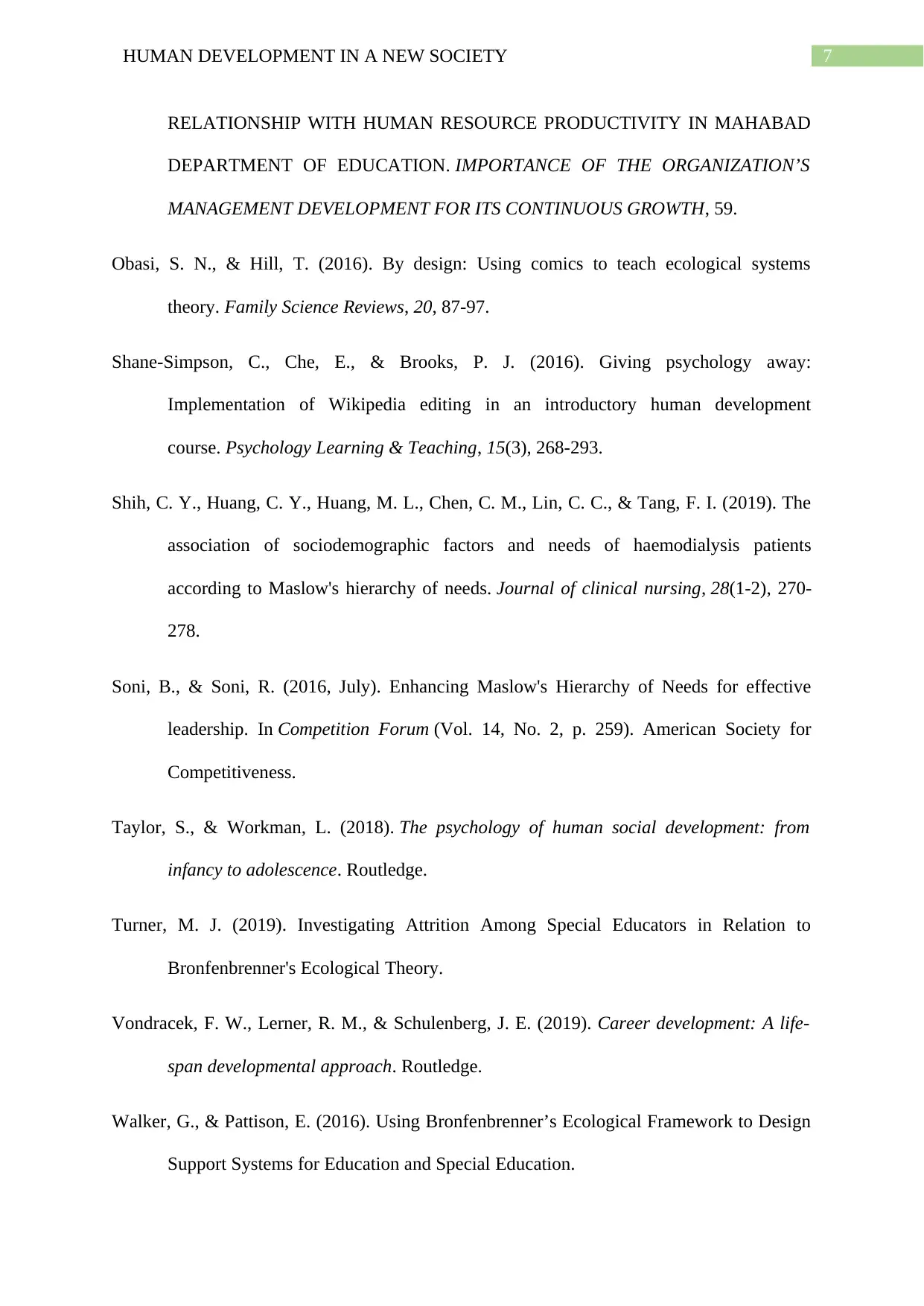
7HUMAN DEVELOPMENT IN A NEW SOCIETY
RELATIONSHIP WITH HUMAN RESOURCE PRODUCTIVITY IN MAHABAD
DEPARTMENT OF EDUCATION. IMPORTANCE OF THE ORGANIZATION’S
MANAGEMENT DEVELOPMENT FOR ITS CONTINUOUS GROWTH, 59.
Obasi, S. N., & Hill, T. (2016). By design: Using comics to teach ecological systems
theory. Family Science Reviews, 20, 87-97.
Shane-Simpson, C., Che, E., & Brooks, P. J. (2016). Giving psychology away:
Implementation of Wikipedia editing in an introductory human development
course. Psychology Learning & Teaching, 15(3), 268-293.
Shih, C. Y., Huang, C. Y., Huang, M. L., Chen, C. M., Lin, C. C., & Tang, F. I. (2019). The
association of sociodemographic factors and needs of haemodialysis patients
according to Maslow's hierarchy of needs. Journal of clinical nursing, 28(1-2), 270-
278.
Soni, B., & Soni, R. (2016, July). Enhancing Maslow's Hierarchy of Needs for effective
leadership. In Competition Forum (Vol. 14, No. 2, p. 259). American Society for
Competitiveness.
Taylor, S., & Workman, L. (2018). The psychology of human social development: from
infancy to adolescence. Routledge.
Turner, M. J. (2019). Investigating Attrition Among Special Educators in Relation to
Bronfenbrenner's Ecological Theory.
Vondracek, F. W., Lerner, R. M., & Schulenberg, J. E. (2019). Career development: A life-
span developmental approach. Routledge.
Walker, G., & Pattison, E. (2016). Using Bronfenbrenner’s Ecological Framework to Design
Support Systems for Education and Special Education.
RELATIONSHIP WITH HUMAN RESOURCE PRODUCTIVITY IN MAHABAD
DEPARTMENT OF EDUCATION. IMPORTANCE OF THE ORGANIZATION’S
MANAGEMENT DEVELOPMENT FOR ITS CONTINUOUS GROWTH, 59.
Obasi, S. N., & Hill, T. (2016). By design: Using comics to teach ecological systems
theory. Family Science Reviews, 20, 87-97.
Shane-Simpson, C., Che, E., & Brooks, P. J. (2016). Giving psychology away:
Implementation of Wikipedia editing in an introductory human development
course. Psychology Learning & Teaching, 15(3), 268-293.
Shih, C. Y., Huang, C. Y., Huang, M. L., Chen, C. M., Lin, C. C., & Tang, F. I. (2019). The
association of sociodemographic factors and needs of haemodialysis patients
according to Maslow's hierarchy of needs. Journal of clinical nursing, 28(1-2), 270-
278.
Soni, B., & Soni, R. (2016, July). Enhancing Maslow's Hierarchy of Needs for effective
leadership. In Competition Forum (Vol. 14, No. 2, p. 259). American Society for
Competitiveness.
Taylor, S., & Workman, L. (2018). The psychology of human social development: from
infancy to adolescence. Routledge.
Turner, M. J. (2019). Investigating Attrition Among Special Educators in Relation to
Bronfenbrenner's Ecological Theory.
Vondracek, F. W., Lerner, R. M., & Schulenberg, J. E. (2019). Career development: A life-
span developmental approach. Routledge.
Walker, G., & Pattison, E. (2016). Using Bronfenbrenner’s Ecological Framework to Design
Support Systems for Education and Special Education.
1 out of 8